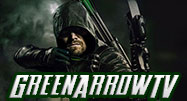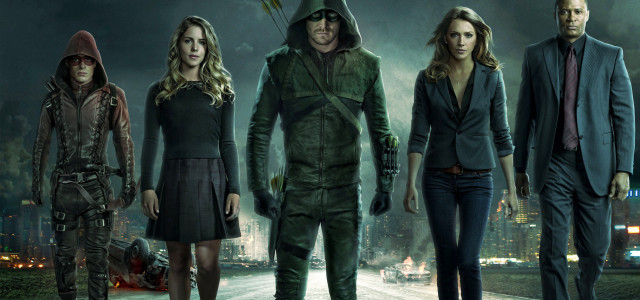
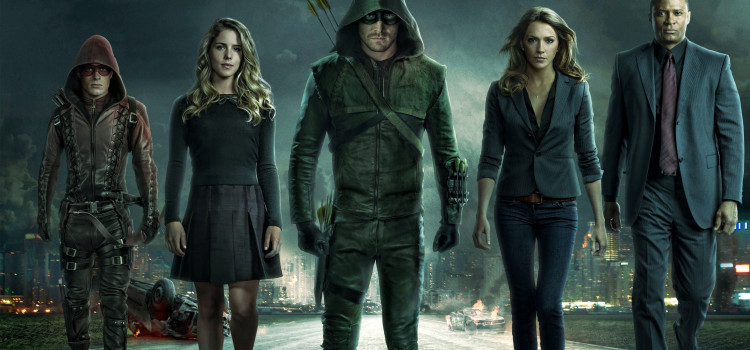
Team GATV Roundtable: Looking Back At Season 3
Opinion September 15, 2015 Craig Byrne

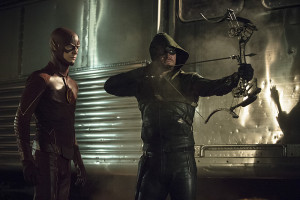 What worked best about Season 3?
What worked best about Season 3?
LAUREL: Like I said, Flash crossovers were awesome. The tones of the two shows are different, but they mesh well. This may be an unpopular opinion, but I liked the storylines about Ray Palmer and about Oliver going all super-dark with the League of Assassins.
CRAIG: I like that we’ve seen how much these characters mean to one another. It’s all a kind of dysfunctional extended family at this point, and with so many characters losing loved ones, that is important. Arrow seemed to work at its best when you had those character interactions.
DEREK: While the execution wasn’t perfect, I really like the concept behind Oliver’s journey this season — the search for identity — and I can buy it in broad strokes. I commend the writers for being willing to make such an internal, existential hurdle the linchpin of the season. Some of the best material was when the show aptly brought that concept to the forefront — Oliver’s discussion with Barry in “The Brave and the Bold,” the cascade of emotions in “Broken Arrow,” and the Ra’s offer and Al Sah-Him stuff was particularly inspired. I really think in a truncated season, with much of the fat trimmed, that arc could have been just as an emotionally strenuous (but not necessarily as dreary) journey of the mind, heart, and soul for Oliver. Because when shades of that poke through, the show is fabulous.
I also enjoyed whenever the supporting characters played into that theme. Laurel took on her sister’s identity, but had to forge her own style and determine her own motivations. Thea had to define herself as someone other than the daughter of a Merlyn or a Queen. Diggle had to figure out if he could be a family man and still live a life of danger. Nyssa grew as a human beyond an assassin or the daughter of the Demon. All of that background stuff tied into the overarching theme of identity, and it kept the season afloat.
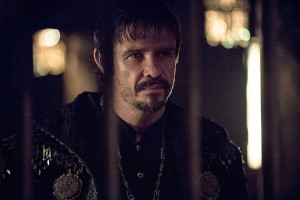 STEPHANIE: What season three had going in its favor was that they didn’t try to recreate the type of villain they had in Slade Wilson. They took a new approach, making Ra’s al Ghul a man who worked more with manipulative tactics and threats than brute force, though they both had a super army of soldiers.
STEPHANIE: What season three had going in its favor was that they didn’t try to recreate the type of villain they had in Slade Wilson. They took a new approach, making Ra’s al Ghul a man who worked more with manipulative tactics and threats than brute force, though they both had a super army of soldiers.
As much as Team Arrow fought amongst themselves, it was worth it to see the other heroes get their chances to shine. Diggle, Thea, Laurel, and even Felicity all had their great hero moments this season. Lastly, the guest stars this season were generally fun to watch and created characters I’d want to see again, such as Katana, Ray Palmer, and Mama Smoak.
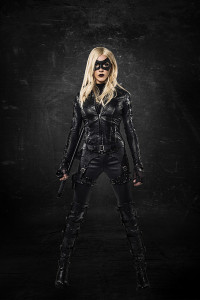 MATT: I was criticized by a number of readers for my review of the season finale being such a negative response to the episode and the season as a whole. Yet, even thinking back on the season now, I’m left with much anger and apathy. There’s frustration because I think there are a number of good elements that just weren’t used very well overall. I’m in a very small minority that actually liked Matt Nable’s interpretation of Ra’s al Ghul, yet his full impact felt muted. I enjoyed the effort to push Laurel towards her Black Canary future. I was a big fan of the team aspects that played at various points throughout the season, really showing reasons why this group should be together rather than just some arbitrary supporting cast for the main character. A number of the developments with Diggle were terrific, particularly fatherhood and his second marriage to Lyla. Still, I will always feel Diggle is underused with so many other characters to service, but I enjoy what we get for the most part. I’m not as over-the-moon on Nyssa as everyone else, but I liked her connection with Laurel and the part she played in everything going on with the League. I also enjoyed that they worked at fleshing her out as a person and not just an antagonist. The concept of Oliver and Malcolm working together to bring down the League from the inside was a great one; if only it had been executed better. And Ray was a big joy.
MATT: I was criticized by a number of readers for my review of the season finale being such a negative response to the episode and the season as a whole. Yet, even thinking back on the season now, I’m left with much anger and apathy. There’s frustration because I think there are a number of good elements that just weren’t used very well overall. I’m in a very small minority that actually liked Matt Nable’s interpretation of Ra’s al Ghul, yet his full impact felt muted. I enjoyed the effort to push Laurel towards her Black Canary future. I was a big fan of the team aspects that played at various points throughout the season, really showing reasons why this group should be together rather than just some arbitrary supporting cast for the main character. A number of the developments with Diggle were terrific, particularly fatherhood and his second marriage to Lyla. Still, I will always feel Diggle is underused with so many other characters to service, but I enjoy what we get for the most part. I’m not as over-the-moon on Nyssa as everyone else, but I liked her connection with Laurel and the part she played in everything going on with the League. I also enjoyed that they worked at fleshing her out as a person and not just an antagonist. The concept of Oliver and Malcolm working together to bring down the League from the inside was a great one; if only it had been executed better. And Ray was a big joy.
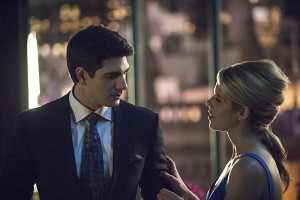 What didn’t work so well in Season 3?
What didn’t work so well in Season 3?
MATT: That said, Ray represented a bigger problem with Arrow this season: world-building. I like and welcome that there’s a larger DCwU, but there was such an effort to create it and fill it out that the show suffered on the whole. Ray’s personality was a welcome presence on the show and the work between Brandon Routh and Emily Bett Rickards was mostly stellar, but I can’t help but feel he ended up fairly superfluous to everything going on. Sure, he played a strong role in helping to stop Ra’s’ plan in the finale, but you could excise much of what the Atom did during the season and not drastically change much. The same goes with the major Flash crossover, which while a superbly entertaining episode, it really stood in the way of momentum. That was the biggest issue with the season is that momentum was all over the place. For the most part, it felt like the season was spinning wheels before lurching forward, only to come to some dead stops again. The majority of that issue comes down to the fact that they didn’t seem to really know the ins and outs of their theme this year. And when you have something as loosey-goosey as an existential crisis on identity, you’ve got to be at the top of your game or it feels to the audience that the show is stumbling around just as much as its lead.
Beyond that, I thought they piddled away a lot of the potential they had for Thea starting on the season. Once she was revealed to be Sara’s killer, she once again became sort of an afterthought. That made so much of her struggle with learning the truth during the middle part of the season ring false. Laurel’s journey as a hero was also filled with a fair amount of frustration, particularly because they would alter her ability and capability to suit whatever given plot situation they needed it to. The idea of her spending the season struggling with becoming a hero was a great one. It was undercut when she would be extraordinarily more than competent in some situations and then alternately a complete paperweight with no skill on others. That coupled with the inexplicable plot thread about keeping Sara’s death from her father surely didn’t help the case that there were a lot of ways in which Laurel was a better character this year. And Quentin was more or less marginalized all year.
STEPHANIE: The first thing that comes to mind is the flashbacks. Having Oliver off the island for a year sounds like a promising idea filled with natural drama and intrigue; however, the Hong Kong story is rather forgettable, aside from introducing us to Maseo and Tatsu. The flashbacks were short, few and far between, and interrupted with flashbacks for other characters, which made the amount of screen time spent in Hong Kong too slim to tell the story as it needed to be told.
In addition, season three struggled to flesh out several of the ideas that they introduced. Oliver is broke, but still has more than enough money to function. Lance has health problems, but what came of that? With so much talk about how the user of the Lazarus Pit doesn’t return the same person he or she died as, I expected them to explore this problem with Thea, but she was back to her normal self an episode or two later. Ra’s wreaking havoc as the Arrow and forcing Oliver to accept his offer through any means necessary didn’t take all that much destruction to convince him. Oliver as Ra’s didn’t work so well because it barely happened.
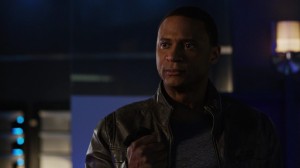 LAUREL: Oliver and Diggle fighting didn’t work for me at all. Until Nyssa started training her, I also didn’t buy Laurel as any sort of superhero. Then there was the Oliver-Felicity love story, which was too awkward. It started out well, but they backed off it too much and then slammed back into romance right at the end. And that driving off into the sunset? It felt weird. Pleasant, sure. But weird. Also, there were the flashbacks. They were pretty abysmal this season.
LAUREL: Oliver and Diggle fighting didn’t work for me at all. Until Nyssa started training her, I also didn’t buy Laurel as any sort of superhero. Then there was the Oliver-Felicity love story, which was too awkward. It started out well, but they backed off it too much and then slammed back into romance right at the end. And that driving off into the sunset? It felt weird. Pleasant, sure. But weird. Also, there were the flashbacks. They were pretty abysmal this season.
DEREK: There seemed to be an endgame in mind, but no one could figure out how to get to it in 23 episodes. So we have a semblance of a beginning, middle, and end, but not one that really flowed. The first half of the season is especially directionless and episodic in a way the show had never been before, with the tags that featured the succeeding week’s plot trying to mask the lack of serialization. The run from “Public Enemy” onward felt a lot more like the show of old, but it was too little too late to throw in all those story beats. I think a lot of that has to do with the identity theme I mentioned before — while it was a great idea in concept, it’s not as clear or quantifiable as season 2’s no-kill rule. There’s nothing tangible about existential questions, so there needed to be more care taken to how that journey was plotted. I think Oliver’s relationship with Felicity was meant to be the physical representation of that crisis, but we’ll get into why that’s problematic later on. And even that spent the majority of the season going in circles.
On a more specific note, Laurel’s big lie to her father about Sara wins the “Moira running for mayor” award for contrived storytelling this season. Treating Quentin like Aunt May did no favors to the plot or the characters, especially considering Laurel finally seemed to be on the right track otherwise and Quentin needed more to do in general. I’m just glad they at least acknowledged how bad it was with Quentin appropriately pissed by season’s end, so I guess it kind of paid off, but not well. Also, what was with Thea’s 45 minute amnesia after going into the Lazarus Pit? Wasn’t there supposed to be terrible unfathomable consequences? That was just silly.
CRAIG: Although I really liked the reveal of Maseo and Tatsu in present day – especially later when she was Katana – the flashbacks were VERY underwhelming…. though I did like “The Return” and I enjoyed seeing Floyd Lawton’s origin story. The few times I really was excited by the flashback, the action cut to and from to an extent that it was hard to connect with it there.
